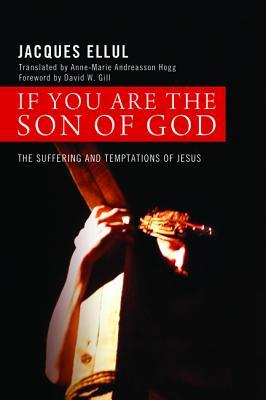- Bíblia
- Leia a Bíblia
- Versões da Bíblia
- Verso do dia
- Planos de Leitura
- Versos por Tópico
- Books of the Bible
- Imagens bíblicas
- Estude
- Comentários
- Concordâncias
- Dicionários
- Enciclopédias
- Sermões
- Bible Atlas & Maps
- BP Wiki
- Devocionais
- Devocionais de hoje
- Light of the World
- Todos os devocionais
- Inspirational Quotes
- Mais
- Picture Quotes
- Videos
- Inspirador
- Estudo da Bíblia
- O que a Bíblia diz
- Bible Q&As
- Daily Bread
- Bible by Genre
- Bible Stories
- Random Bible Verse
- Comunidade
- Store
If You Are the Son of God: The Suffering and Temptations of Jesus
by Jacques Ellul
This significant book, written a few years before his death, presents Ellul's fullest understanding of the meaning of Jesus' life. One finds all of the major themes of Ellul's writings. The first half of this book deals with Jesus' sufferings, which are by no means limited to Good Friday. Through Jesus' identification with "the whole human condition," we are offered the possibility of both enduring and overcoming suffering.
Similarly, the temptations are understood beyond the wilderness temptation narrative since Jesus experiences them throughout his ministry. Ellul believes temptations are ultimately human avenues for tempting God, and so focuses on the discussion power and "non-power," be it on personal or political levels. Appropriately, Ellul enters into the passion narrative not simply in the context of suffering but in the context of temptation, where Jesus could have easily "proved his divinity," but chose instead to reveal both the character and way of God.
Similarly, the temptations are understood beyond the wilderness temptation narrative since Jesus experiences them throughout his ministry. Ellul believes temptations are ultimately human avenues for tempting God, and so focuses on the discussion power and "non-power," be it on personal or political levels. Appropriately, Ellul enters into the passion narrative not simply in the context of suffering but in the context of temptation, where Jesus could have easily "proved his divinity," but chose instead to reveal both the character and way of God.
Paperback, 95 pages
Published May 5th 2014 by Cascade Books (first published 1991)
Se inscrever
© 2025 Bibleportal.com Todos os direitos reservados.

Jacques Ellul was a French philosopher, law professor, sociologist, lay theologian, and Christian anarchist. He wrote several books about the "technological society" and the intersection between Christianity and politics, such as Anarchy and Christianity (1991)--arguing that anarchism and Christianity are socially following the same goal.
A philosopher who approached technology from a deterministic viewpoint, Ellul, professor at the University of Bordeaux, authored 58 books and more than a thousand articles over his lifetime, the dominant theme of which has been the threat to human freedom and Christian faith created by modern technology. His constant concern has been the emergence of a "technological tyranny" over humanity. As a philosopher and lay theologian, he further explored the religiosity of the technological society.
... Show more